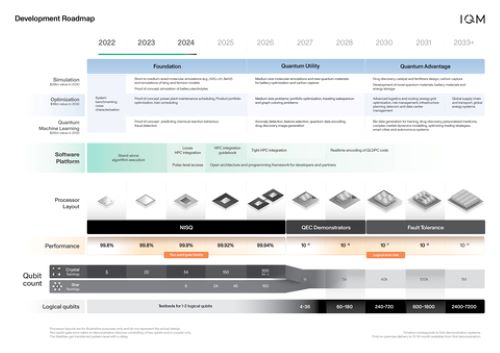IQM Quantum Computers Unveils Development Roadmap

IQM Quantum Computers (IQM), a global leader in superconducting quantum computing, today announced its development roadmap with technical milestones targeting fault tolerant quantum computing by 2030, while enabling a dedicated Noisy Intermediate-Scale Quantum (NISQ) approach for near-term usage.
Since its start, IQM has successfully delivered full-stack quantum computers based on its first three processor generations. IQM’s 12-year roadmap reflects its vision for pioneering quantum solutions through novel algorithmic approaches, modular software integration, and scalable hardware advancements. It leverages the company’s ability to design and fabricate next-generation quantum processors with seamless integration into full-stack systems controlled by an open software stack.
IQM’s unique co-design capabilities steer the roadmap towards efficient error-correction implementations with high system performance by merging IQM’s two processor topologies IQM Star and IQM Crystal. To enable the roadmap, IQM systematically invests in its R&D, testing and fabrication facilities to boost technology scaling up to 1 million qubits while maintaining high qubit quality and gate fidelity.
To support the developer community and to ease the usage of quantum computing, IQM will also enable tight high-performance computing (HPC) integration and create a special software development kit (SDK). Open interfaces will empower the ecosystem, including quantum error mitigation, co-develop libraries and use-cases on IQM’s quantum computers.
The company aims to achieve quantum advantage across multiple industry domains, focusing on quantum simulations, optimization, and quantum machine learning. According to a McKinsey report, these selected use-cases will unlock a value potential of more than US$28 billion by 2035.
Quantum advantage will be provided by fully error-corrected systems with hundreds to thousands of high-precision logical qubits, for which error correction will be enabled by efficiently implementing novel quantum low-density parity-check (QLDPC) codes. This approach reduces the hardware overhead by a factor of up to 10 compared to surface code implementation.
Furthermore, IQM is targeting high-precision logical qubits with error rates below 10^-7, enabling quantum advantage for applications demanding exceptional accuracy, such as in chemistry and materials science.
“We are implementing Quantum low-density parity-check (QLDPC) codes through a novel chip topology, enabled by our uniquely connected Star topology, long-distance couplers and a very compact approach for advanced packaging and signal routing,” said Dr. Jan Goetz, Co-Founder and Co-CEO of IQM Quantum Computers. “This underlines our commitment to hardware efficiency, enabling a feasible and scalable pathway to fault tolerance combined with an open and modular software architecture.”
Goetz emphasizes that the company’s proprietary cleanroom facilities will support the fabrication of complex processors with unique long-range connections, facilitating high-performance quantum processors.
To this end, IQM will implement novel solutions for advanced packaging and 3D integration to ensure scalability while maintaining its ambitious goals to reduce error rates, while its large-scale processors will be built up in a modular way and powered by cryogenic electronics. The results are reduced heat load, strongly miniaturized packaging solutions, and reduced cost per qubit. These features will result in more performant and affordable products for IQM’s customers in the HPC and enterprise market.
Offering on-premises and cloud access, IQM has been specializing in integrating quantum systems into HPC centers since 2020. The latest is Germany’s first hybrid quantum computer at the Leibniz Supercomputing Centre.
IQM aims to explain further details of the roadmap in future publications, blog posts, and at industry and academic events.
Last Updated on 2 months by News Desk 1













